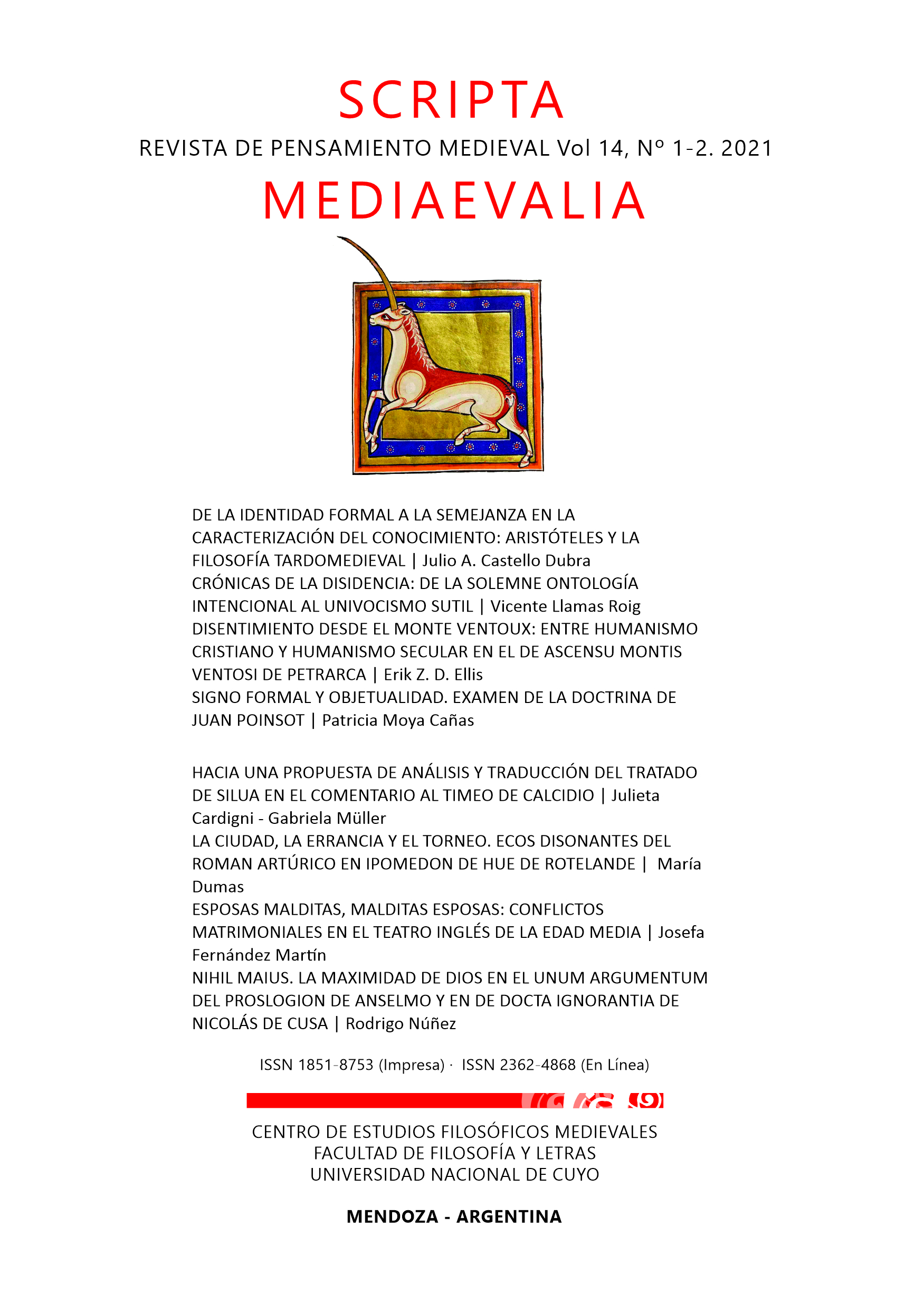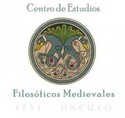From formal Identity to Resemblance in Characterizing Cognition: Aristotle and Late Medieval Philosophy
DOI:
https://doi.org/10.48162/rev.35.001Keywords:
cognition, similitude, Aquinas, Olivi, OckhamAbstract
The paper deals with three outstanding Late Medieval thinkers’s repeated use of the notion of resemblance in characterizing cognition: Thomas Aquinas, Peter of John Olivi and William of Ockham. In his De anima Aristotle just uses such notion when criticizing the earlier philosophers’s opinions and makes some allusions to it when dealing with sensible perception. When it comes to intellect, resemblance is totally absent. As for Aquinas, he turns from formal identity to resemblance, as if they were coincident or interchangeable concepts. Resemblance plays a major role in his characterization of both sensation and intellection. Olivi adopts a perspective radically different as a consequence of criticizing the theory of species. As there is not any causal influx from abroad, it is the cognitive act itself which assimilates to the object. In changing his mind with respect to his earlier theory of fictum and adopting eventually a theory of mental acts, Ockham does not give up to resemblance in characterizing universal concepts. Rather, he uses resemblance in characterizing such concepts as natural signs.
References
Adams, Marilyn McCord. William Ockham. Indiana: University of Notre Dame Press, 1987.
Adriaenssen, Han Thomas. “Peter John Olivi on Perceptual Representation”. Vivarium 49 (2011): 324-352.
Aristóteles, De anima, trad. de Marcelo Boeri Aristóteles, Acerca del alma. De anima. Buenos Aires: Colihue, 2010.
Aristóteles. De interpretatione, en Categoriae et Liber de interpretatione, ed. Minio-Paluello. Oxford: Clarendon Press, 1949.
Boehner, Philoteus. “The Realistic Conceptualism of William Ockham”. Traditio 4 (1946): 307-335.
Gál, Gedeon. “Gualteri de Chatton et Guillelmi de Ockham controversia de natura conceptus universalis”. Franciscan Studies (1967): 191-212.
Guillermo de Ockham, Expositio in librum Perihermeneias Aristotelis, § 7, en Opera Philosophica II [OPh II], ed. A. Gambatese, S. Brown. St. Bonaventure, NY: The Franciscan Institute, 1978.
Guillermo de Ockham, Quaestiones in librum Physicorum Aristotelis, en Opera Philosophica VI, ed. S. Brown. St. Bonaventure, N.Y.: The Franciscan Institute, 1984.
Guillermo de Ockham, Quaestiones in librum secundum Sententiarum (Reportatio), en Opera Theologica V, ed. G. Gál, R. Wood. St. Bonaventure, N.Y.: The Franciscan Institute, 1981.
Guillermo de Ockham, Scriptum in librum primum Sententiarum Ordinatio, en Opera Theologica I, ed. G.
Gál, S. Brown. St. Bonaventure, N.Y.: The Franciscan Institute, 1967.
Guillermo de Ockham, Scriptum in librum primum Sententiarum Ordinatio, en Opera Theologica II, ed. S. Brown, G. Gál. St. Bonaventure, N.Y.: The Franciscan Institute, 1970.
Guillermo de Ockham, Summa logicae, en Opera Philosophica I, ed. Ph. Boehner, G. Gál, S. Brown. St. Bonaventure, N.Y.: The Franciscan Institute, 1974.
Kelley, Francis E. “Some Observations on the ‘Fictum’ Theory in Ockham and its Relation to Hervaeus Natalis”. Franciscan Studies 38 (1978): 260-282.
Martínez Ruiz, Carlos. “En los orígenes de la teoría escotista de la intencionalidad: Odón Rigaud y Pedro de Juan Olivi”, en Estudios sobre lenguaje, conocimiento y realidad en la Baja Edad Media, ed. Carlos Martínez Ruiz. Córdoba: Brujas, 2014.
Olivi, Pedro de Juan. Quaestiones in secundum librum Sententiarum, ed. B. Jansen. Florencia: Quaracchi, 1926.
Panaccio, Claude. “Aquinas on Intellectual Representation”, en Ancient and Medieval Theories of Intentionality, ed. Dominik Perler. Leiden: Brill, 2001.
Panaccio, Claude. Le discours intérieur de Platon à Guillaume d’Ockham. París: Seuil, 1999.
Panaccio, Claude. Ockham on Concepts.Aldershot: Ashgate, 2004.
Pasnau, Robert. Theories of Cognition in the Later Middle Ages. Cambridge: Cambridge University Press, 1997.
Perler, Dominik. “Essentialism and Direct Realism: Some Late Medieval Perspectives”. Topoi 19 (2000): 111-122.
Perler, Dominik. Théories de l’intentionnalité au moyen âge. Paris: Vrin, 2003.
Silva, José Filipe y Toivanen, Juhana. “The Active Nature of the Soul in Sense Perception: Robert Kilwardby and Peter Olivi”. Vivarium 48 (2010): 245-78.
Tomás de Aquino, Quaestiones disputatae de veritate, en Opera omnia iussu Leonis XIII P. M. edita, t. 22: Quaestiones disputatae de veritate. Roma: Ad Sanctae Sabinae/Editori di San Tommaso, 1970-1976.
Tomás de Aquino, Quaestiones disputate depotentia, en Quaestiones disputatae, t. II, ed. P. M. Pession, 10ª ed. Torino-Roma: Marietti, 1965.
Tomás de Aquino, Scriptum super libros Sententiarum magistri Petri Lombardi episcopi Parisiensis I, ed. P. Mandonnet. París: P. Lethielleux, 1929.
Tomás de Aquino, Sentencia libri de animae, en Opera omnia iussu Leonis XIII P. M. edita, t. 45/1. Roma-Paris: Commissio Leonina-J. Vrin, 1984.
Tomás de Aquino, Summa Theologiae, en Opera omnia iussu impensaque Leonis XIII P. M. edita, t. 4-5. Roma: Ex Typographia Polyglotta S. C. de Propaganda Fide, 1888-1889.
Downloads
Published
How to Cite
Issue
Section
License

This work is licensed under a Creative Commons Attribution-NonCommercial-ShareAlike 3.0 Unported License.






































